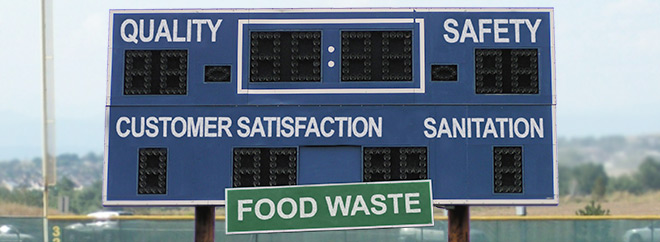Is Food Waste On Your Scoreboard? 5 Questions to Pressure-Test Your Operation

You measure your foodservice operation’s health by looking at a range of key metrics: quality, safety, sanitation and profit. But what about food waste? Is that on your daily “scoreboard” as a measure of success? For most, it’s missing.
If you’re not measuring food waste, you should prioritize getting started. The contents of your restaurant’s kitchen compost or garbage will tell you a great deal about the health of your business, as well as about opportunities for greater efficiency. Food is money. And every time food gets thrown in the trash, it literally represents money leaking from your bottom line.
Following are five questions I would challenge all operators to ask your teams as a way to pressure test how committed your operation is to food waste minimization and kitchen efficiency.
1. How much food (and money) did you throw away in your kitchen last week?
If you can’t answer this question, you’re lacking data, and data is critical for any key performance indicator (KPI). You need data to measure success. Make sure you know exactly how much of each food item is being thrown away each week, by weight and value, and the specific reasons that items are getting tossed. This data is critical to informing your strategies for minimizing that waste going forward. (LeanPath Systems make this data collection process fast, easy and engaging for employees.)
2. When was the last time your executive chef discussed managing wasted food in a stand-up meeting?
Food waste should be talked about regularly and openly to drive improvement. Focus on creating a kitchen culture where staff members are comfortable talking freely about food waste and ideas to minimize it. If you talk about it consistently in meetings, staff members will understand this is a top area of concern and be more mindful of what they throw away.
3. If you asked a kitchen team member why managing food waste is important, what would they say?
Every team member in your kitchen should be informed and educated about the importance of food waste minimization. This relates to the dialogue described #2 above, but I’d encourage you to take it a step further. Put up signs in your kitchen that speak to ‘our commitment not to waste food.’ Hold brief training sessions that inform staff members about how much food is wasted and the critical role that they play in helping to prevent it. Your staff members will have the greatest impact on how effectively you can manage waste, so they need to buy in to the ‘why.’ If you can, get people to share personal stories with their colleagues about why they don’t like food waste. These stories will have a major impact in setting the right tone and enhancing commitment.
4. How much of your food cost variance is due to waste?
Many operations think that they have food waste covered because their POS and back office systems calculate food cost variance. But most POS systems won’t tell you exactly what’s driving the difference between theoretical and actual food cost. Knowing how much of the variance can be attributed to food waste gives you a clear sense of the magnitude of other issues (i.e. theft, yield, and portioning). Look at which foods are wasted most and see if you can spot them in your variance. If you don’t have this data, go back to point #1.
5. What is your goal for food waste reduction this week or month?
Every operation striving for continuous improvement with waste minimization should have a specific, measurable goal that the team is working towards each week or month. Most LeanPath clients use their top wasted food as a guiding point for this one. If last week’s top wasted food was soup, this week we might focus on reducing soup waste by 50%. Everyone on the team should know the goal and be invited to contribute specific ideas for improvement.
If you have all these questions covered already, congratulations! If you would like to get a better handle on some of these questions and the associated measurement methods and tools, we’re here to help. Every operation has an opportunity to be more efficient—it’s time to put food waste on your scoreboard.

